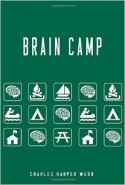
Book Review: Brain Camp by Charles Harper Webb

Brain Camp
Poems by Charles Harper Webb
University of Pittsburgh Press, March 2015
ISBN-13: 978-0822963387
$15.95; 90 pp.
Reviewed by Maggie Trapp
Charles Harper Webb writes with vinegar and honey. We’re made to feel part of a coterie of inside jokes and clever references, and Webb is a welcoming guide into his world of sardonic asides and awed tributes. The voice in these poems is both dark and light, droll but touching, caustic yet nostalgic, wryly winking and nodding while clearly embracing the absurd.
In Brain Camp Webb is a prankster presenting trenchant poems that both work and play with words. He offers images and scenes that rouse us from our reading, encouraging us to see anew. In “Praying Mantis on a Chain-Link Fence” we read about “that merciless triangular green head,” and in “Friar Towhee” we learn of the speaker’s son that
He’s too intent on blowing up the space-
helmeted dandelions that dot our lawn.
These are small moments made large through language. Webb takes what seems expected, even unnoteworthy, and he renders it striking, peculiar, and newly memorable. In “Elixir” Webb plays with words’ meanings, histories, and alchemies both etymologically and emotionally. In “Watch for Dwarfs” the macabre, unacceptable yet laughable fears that dog us when we’re new parents appear. And in “The Best Part of the Day” we witness a nostalgia, a longing, a cherished dailiness we can all recognize.
In “How Can I Exceed Your Expectations?” Webb is at his acute and derisive best, offering mordant musings on the bathos and bombast in business-speak that we’ve become accustomed to. After a cheery titular query from a bank employee, Webb devises multiple stanzas’ worth of rejoinders, getting at the risibility in what passes for appropriate exchanges between people:
Cut earth’s human population two-thirds, without being mean.
***
Sell me on the joys of aging and disease.
Get my daughter to like whole wheat bread, lima beans, and peas.
Deny the IRS all knowledge of me.
In “Hospital,” Webb presents a catalogue of playful, seemingly extemporized free association that circles around the anxiety inherent in all hospital visits. The obvious joy in the language offsets whatever more upsetting experience is underneath all this wordplay. Webb manages to make light of a situation while letting us in on weighty matters:
Hot spittle, sizzling on pain’s grill.
Hopcycle: a gamboling bike. Hopsicle:
bouncy, tooth-chilling, bad for you.
Opposite of hope’s fiddle. No
“Soldier’s Joy.” No “Jolie Blonde.”
Losspital: a place where losers
meet. Hospice: little. (How big
do death-rooms have to be?)
Hiss bottle, has pickle. Ass brittle—
like the rest of me! “Have you
ever,” a clipboard-man
demands, “been hospitalized?”
Been ossified? Alphabetized?
Fossilized? Caramelized?…
Webb often includes curious, seemingly non sequitur epigraphs with his poems, and these brief jottings of things read or overheard serve to usher us into both the poem the epigraphs sit atop as well as into Webb’s own deft and daft sources of inspiration and lines of logic.
“American Dream”’s epigraph is
“Why couldn’t it be true?
—Victim of a Nigerian Scam”
“Someone Else’s Life”’s epigraph is
“What if, when you die, someone else’s life flashes before your eyes?
—Overheard”
“Things We Know”’s epigraph is
“When Edna goes to church, her head goes with her.
—Stephen Pinker, How the Mind Works”
“Webb Could Say Less, May Be?” is attributed as
“—from a student evaluation”
“Haunted”’s epigraph is
“Mom Hosts Haunted House in Home Where Children Died.
—KTLA News”
and “Approaching Poetry”’s epigraph is
“I’m terrified to approach poetry.
—English teacher, Hoover High”
These textual tags suggest a layering in Webb’s poems. In these scraps and attributions, it’s as if there’s the thing that inspired the poem, and then there’s the poem, and we can see the traces of the oddly fitting fragments as they become larger and take on shape and nuance in Webb’s verse renderings. These epigraphs position the poems in the quotidian life all around us, and we can see Webb’s lucid voice and expansive mind working these bits of cultural ephemera into resonant lines. In employing these “real world” inscriptions, Webb merges the leavings of our days into that other realm that is poetry, and in doing so shows us how inspiration arrives out of the seeming incidental. He shows us that poetry partakes of all the chatter, squabbles, misguided notions, misunderstood phrases, and corporate-speak gewgaws that inundate each of our lives. Webb’s poems are brimming with inspired, off-kilter, lovely moments, and it’s wonderful to get a glimpse via these epigraphs into his own moments of jumping off an everyday moment and into rich, ringing verse.
Brain Camp celebrates and pokes fun at the same time. We continuously feel Webb inviting us in to a place where making fun makes the most sense.
Maggie Trapp teaches literature and writing online for UC Berkeley, and she writes reviews for various publications.

Leave a Reply